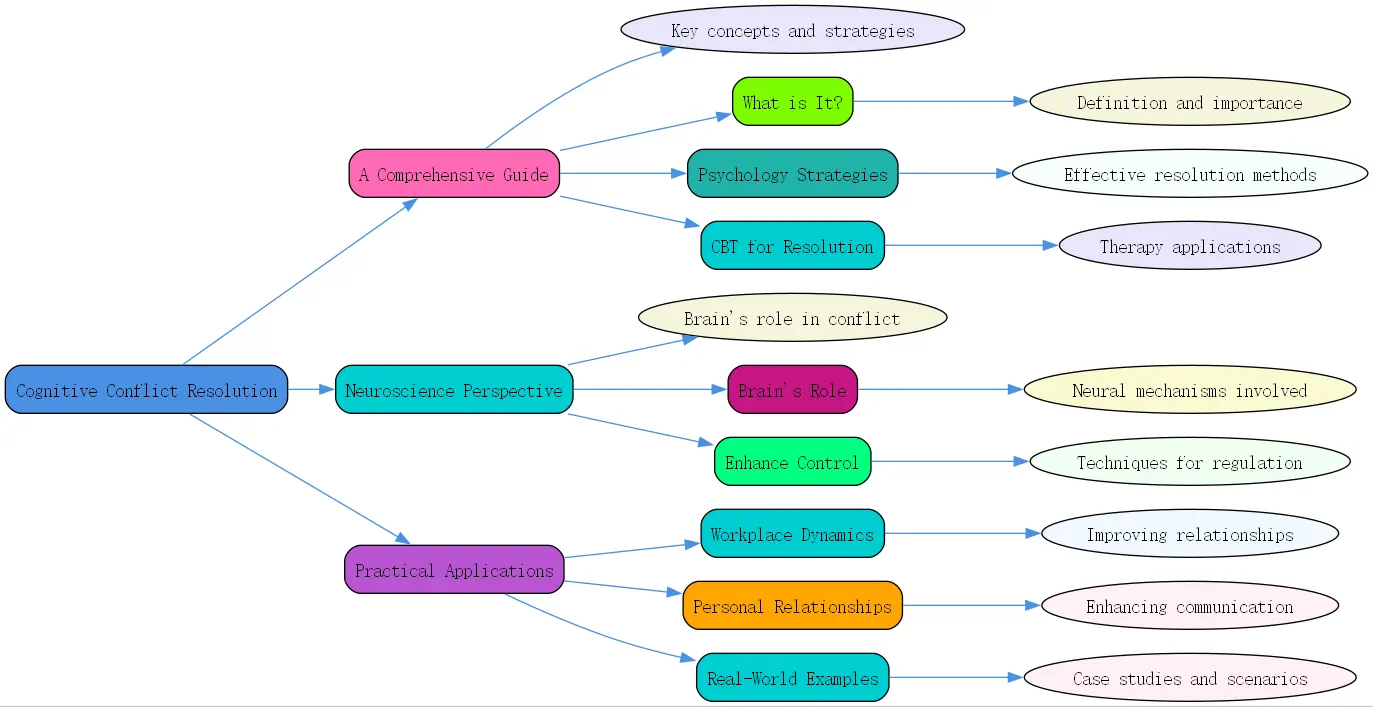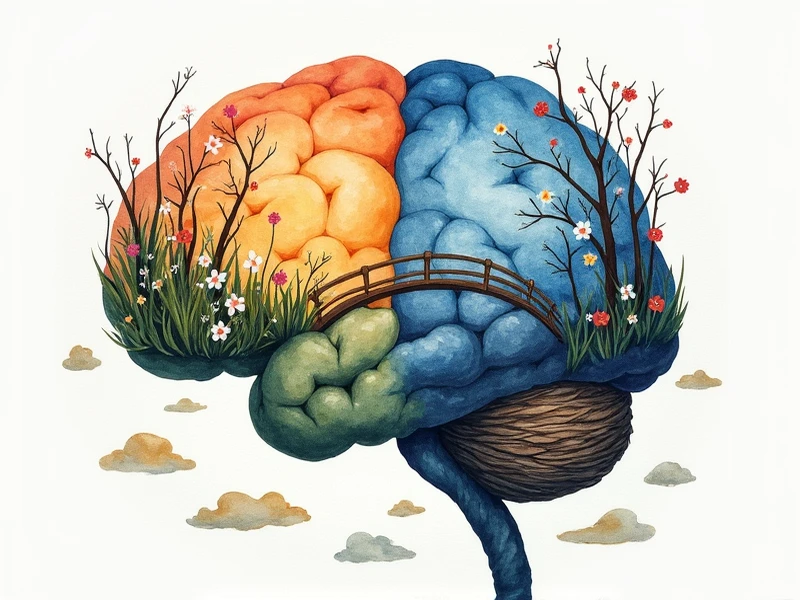Cognitive Conflict Resolution: A Comprehensive Guide

Conflicts are an inevitable part of life. They occur in workplaces, personal relationships, and even within our own minds. One of the most effective ways to address them is through cognitive conflict resolution—a strategic approach grounded in cognitive psychology and neuroscience to confront and resolve conflicts at their core.
This comprehensive guide explores key concepts, actionable strategies, and practical applications of cognitive conflict resolution. Whether you’re navigating interpersonal disputes or striving for emotional balance, these insights will empower you to transform tension into constructive solutions.
What is Cognitive Conflict Resolution?
Defining Cognitive Conflict
Cognitive conflict refers to the clash between contradictory thoughts, beliefs, or decisions within your mind or between individuals. These conflicts can stem from cognitive biases, stress, misunderstandings, or differing perspectives. By acknowledging and addressing the root causes of these conflicts, cognitive conflict resolution seeks to create harmony and meaningful change.
The Role of Cognition in Conflict Resolution
Cognition plays a pivotal role in how we perceive, process, and respond to disagreements. Our thoughts and emotions directly influence our reactions to conflict. By reshaping negative thought patterns and altering how we view the dispute, cognitive conflict resolution enables individuals to make objective decisions and reduce emotional overwhelm.
Why Cognitive Approaches are Effective
Unlike traditional conflict resolution approaches, cognitive methods focus on understanding internal mental processes to create lasting change. By applying techniques from cognitive neuroscience and psychology, individuals can build emotional awareness, control impulsive responses, and foster better communication. These methods are particularly effective for resolving persistent conflicts and self-sabotaging behaviors.

Cognitive Psychology Conflict Resolution Strategies
Identifying Cognitive Biases in Conflict
One of the first steps in cognitive conflict resolution is recognizing how biases influence our judgment. Common biases—like confirmation bias and attribution errors—can distort our understanding of the situation, leading to unfair conclusions. Identifying and challenging these cognitive biases helps ensure an unbiased approach to resolution.
Reframing Techniques for Conflict Resolution
Reframing involves shifting your perspective to view conflicts differently. For example, instead of perceiving disagreements as personal attacks, you can focus on their potential for growth and connection. Cognitive psychology provides tools for effective reframing, enabling individuals to focus on solutions rather than problems.
Improving Communication Through Cognitive Awareness
Miscommunication is one of the leading causes of conflict. Cognitive conflict resolution emphasizes enhancing communication by understanding how emotions and thought patterns affect dialogue. For instance, avoiding overgeneralizations and expressing needs transparently fosters mutual understanding, reducing friction and misunderstandings.
Cognitive Behavioral Therapy (CBT) for Conflict Resolution
Applying CBT Principles to Interpersonal Conflicts
Cognitive behavioral therapy (CBT) is a powerful tool for conflict resolution. By addressing negative thought patterns and encouraging constructive behaviors, CBT helps reframe interpersonal disagreements. Whether applied in the workplace or personal relationships, CBT promotes healthier perspectives and fosters mutual respect.
Challenging Negative Thought Patterns
CBT techniques challenge harmful thoughts that exacerbate conflict, replacing them with positive and rational alternatives. For instance, thoughts like “This person doesn’t respect me” can be reframed to “Perhaps this behavior stems from stress, not disrespect.” This nuanced thinking lays the foundation for resolving conflicts empathetically.
To learn more, explore BrainTalking’s helpful resource Managing Social Anxiety: A Cognitive Behavioral Therapy Approach Client Workbook, a practical guide emphasizing CBT strategies for emotional well-being.
Developing Adaptive Coping Mechanisms
Resolving conflicts requires emotional resilience. CBT equips individuals with adaptive coping mechanisms, such as mindfulness practices, to alleviate stress during disputes. For example, meditation and relaxation techniques foster clarity and help reduce impulsive reactions during emotionally charged conversations.
The Neuroscience of Cognitive Conflict Resolution
Understanding the Brain’s Role in Conflict
Neural Pathways Involved in Conflict Response
Conflicts activate specific neural pathways, particularly those connected to emotional regulation. The amygdala, responsible for processing emotions like fear and anger, often dominates during disputes. Cognitive conflict resolution works by engaging the prefrontal cortex—the decision-making center—allowing reason and logic to guide responses.

How Emotions Impact Cognitive Processes During Conflict
Stress and intense emotions can undermine cognitive functioning, impairing your ability to resolve disputes effectively. Techniques like breathing exercises and positive visualization help regulate emotions, strengthening your cognitive response to disagreements.
The Influence of Stress on Cognitive Function
Chronic stress during conflicts can impair memory, judgment, and emotional regulation. Neuroscience-backed strategies like neuroplasticity practices help individuals create adaptive responses to stress, building resilience and fostering productive dialogue.
Techniques to Enhance Cognitive Control
Mindfulness Practices for Conflict Management
Mindfulness involves staying emotionally present during conflicts without resorting to reactive thinking. Techniques such as mindful breathing and self-reflection foster self-awareness, improving how you communicate and interpret emotional cues.
Strategies to Improve Emotional Regulation
Improved emotional regulation is key for conflict resolution. Activities such as guided hypnosis—like those offered by innovators such as Joseph Clough—teach the unconscious mind to adapt and reduce triggers that intensify disputes.
Using Neuroplasticity to Change Conflict Behaviors
Neuroplasticity, or the brain’s ability to reorganize itself, can help alter conflict-triggering behaviors. By reinforcing new, constructive thought patterns, individuals can build mental habits that allow them to approach disputes confidently and calmly.
Practical Applications of Cognitive Conflict Resolution
Improving Workplace Dynamics
Using Cognitive Strategies to Manage Team Conflicts
Workplace conflicts can hinder productivity and morale. Applying cognitive strategies—such as identifying underlying biases—helps teams address misunderstandings effectively. This fosters better collaboration and reduces friction among coworkers.
Building a Culture of Constructive Communication
A cognitive approach empowers workplaces to build cultures of mutual respect and understanding. Methods like reframing and improved communication ensure that stakeholders approach disputes as opportunities for personal and professional growth rather than as barriers.
Reducing Stress and Burnout Through Cognitive Techniques
Chronic conflict in professional settings often leads to burnout. Incorporating cognitive neuroscience tools into wellness protocols, such as mindfulness exercises, helps employees manage stress and improve well-being.
Enhancing Personal Relationships
Applying Cognitive Principles to Resolve Relationship Issues
Cognitive conflict resolution techniques are highly effective in personal relationships. By focusing on mutual understanding and reframing perspectives, individuals can navigate common disagreements—such as financial or emotional disputes—more efficiently.
Improving Empathy and Understanding
Empathy is a vital element in cognitive conflict resolution. Through techniques like active listening and cognitive awareness, individuals can step into each other’s shoes and gain insights into opposing viewpoints, strengthening connections.

Building Stronger, More Resilient Relationships
The application of cognitive strategies promotes healthier relationships. By combining emotional awareness and practical psychology methods, individuals become better equipped to handle stress, resolve disagreements, and foster trust.
Cognitive Conflict Resolution: Real-World Examples
Cognitive conflict resolution has found its way into various domains. From improving workplace environments to addressing personal challenges, it delivers transformative results. For example:
- Corporate Success: Companies employing cognitive methods have built stronger teams with fewer disputes.
- Personal Growth: Couples engaged in CBT principles report improved communication and mutual respect.
- Individual Achievement: Techniques like mindful reframing empower individuals to overcome self-sabotaging thoughts.
Question & Answer Section
Q: How does cognitive conflict resolution differ from traditional conflict resolution approaches? A: Unlike traditional methods that often focus solely on external mediators or compromises, cognitive conflict resolution digs deeper into mental processes. By addressing underlying cognitive biases, emotional triggers, and neural pathways, it teaches individuals to resolve conflicts sustainably. Its focus on internal mental mechanics ensures long-lasting results, making it more effective for chronic disputes compared to surface-level resolutions.
Key Takeaways
- Cognitive conflict resolution focuses on mental processes to address the roots of conflict effectively.
- CBT techniques emphasize reframing, emotional regulation, and adaptive coping mechanisms.
- Neuroscience-backed strategies such as neuroplasticity promote lasting behavioral change.
- Cognitive approaches empower individuals to enhance communication, empathy, and resilience across all life domains.
For more tools to manage emotional challenges, check out BrainTalking’s comprehensive workbook Managing Social Anxiety: A Cognitive Behavioral Therapy Approach Client Workbook.



